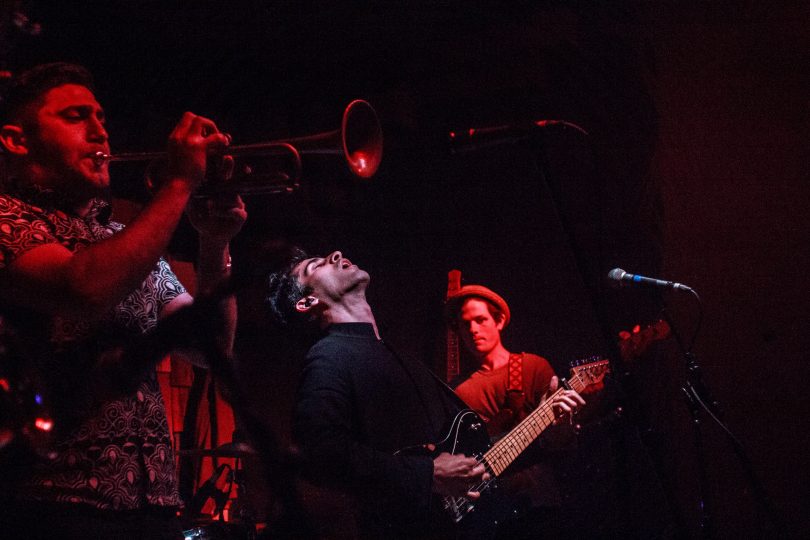“I think disparity is real for the Arab community in NOLA and it becomes very clear when you look at the Muslim community. You notice the gap of economic status when you compare the Islamic Center on St. Claude to Masjid Omar in the West Bank,” Kuwaiti songwriter +Aziz tells me. He’s the founder of Kuwaisiana, a local indie rock outfit merging New Orleans musicianship with the influence of the Arabian Peninsula.
The band (comprised of Istanbul’s Dehan Elçin, San Diego’s Nick Ferreirae, Chicago’s Patrick Driscoll, and France’s mononymous Matthieu), who today (March 8) is premiering two new songs, was born out of several conceptual conversations +Aziz was having with fellow creatives and thinkers. “I was ranting about Khaliji [a term for people of the Arabian Peninsula] culture to a writer friend and he suggested meshing the map of Louisiana and Kuwait together. This visual led to the band name,” he says.
“People will usually have to dig to find that connection, though. I know from personal experience that the average American doesn’t see the connection to Kuwait. They think Crazy-iana, Qwaiziana or don’t even know how to read/pronounce the name (but it’s great for SEO!). All in all, a band name matters very little compared to the content you make and community you shape. My favorite bands have names like At-the-Drive-In and Smashing Pumpkins, you know? I’m a true believer in the power of ambiguity and I enjoy making obscure connections colored by my point-of-view. As my lyrics show, I choose to be creative and ambiguous in the way I tell stories. I think it must drive some people crazy though.”

Kuwaisiana. Photo by Daniel Grey
Kuwaisiana have songs in both Arabic and English and their rock sound is intentional. “Initially I was drawn to the idea of developing Khaliji Rock, because although hip-hop has made leaps and bounds in the Middle East, other genres of music like punk, rock and ska haven’t really been explored as much. So that fusion became a little bit of a mission, I suppose.”
+Aziz mentions Mousa Hamdan, a member of the Arab community of New Orleans who’s led a successful career managing Curren$y and working with Wiz Khalifa (the two just performed at the House of Blues here, on Mardi Gras night). For the band, taking advantage of opportunities to interact with the city’s Arab community is of paramount importance, particularly as it relates to expanding people’s conceptions of what an Arab American is. “Kuwaisiana had some great interaction with NOLA’s Arab and Muslim communities through a fundraiser for Syrian refugee at Loyola University in 2017. We’ve also volunteered our time at a function that happened right next to a mosque last year, so I’ve found people to be incredibly open-minded but also quite suburban,” he tells me.
When asked to share thoughts on things about the Arab community of New Orleans that folks may not know, +Aziz takes a wider approach.
“As Arab as I am, it is highly unusual to find someone from The Arabian Peninsula (referred to as Khaleeji or Khaliji) who relocates to the U.S., because you can make good money back home. There is no genuine history of migration when you look at countries like Saudi Arabia, Kuwait, Qatar, the UAE, etc. In other words, I am not representative of the Arab-American community nor am I representative of a native Middle Easterner, but I am somehow also inherently a part of these groups. Most Arab-American families migrated to the U.S. due to economic or political hardships. Folks from countries like Lebanon, Syria, Palestine, etc. have a richer history of migration to the U.S. than other parts of the Middle East, especially when compared to the oil-rich region I’m from. If you do anything after reading this interview, please look up the word “Khaleeji”. My story is one of self-exile.”
Kuwaisiana describes itself as making a danceable, raw big band sound with a world music influence. That’s all on display on “Bara7a” and “Cymbal of This City.”
“Bara7a” is a Kuwaiti word for “something like an open sandlot in the middle of a residential area. There was one such soccer field in Mishref in particular that this song is about.” The song, says +Aziz, is “a coming of age story of sorts.”
For “Cymbal of the City,” the motto is “We have a tendency to downplay the power of what an individual or small group can achieve. Don’t let your city/town get you to think otherwise!”
The artwork for both songs was done by Shelby Criswell.
Kuwaisiana has launched a Patreon account, which allows fans to support the band. But that’s not the only goal. +Aziz hopes to grow the band into a full-fledged touring act, not just to perform but also to “tackle widespread misunderstandings of Arab, Persian, Desi and MENA cultures.”
On April 26, Kuwaisiana will appear at Festival Internationale de Louisiane, which he calls “a huge milestone for us.” Immediately thereafter, it’s off to the studio to record new material. “In our new material, we are working towards blending Arabic and English lyrics within the same song instead of parsing them out the way we did on the debut release,” he says.
You can check out that debut release, as well as other music from Kuwaisiana, by visiting the band’s official website.




